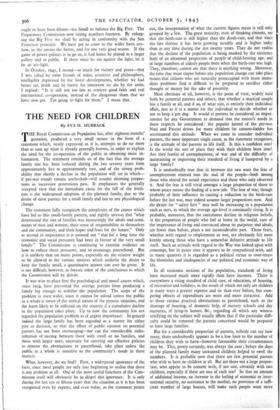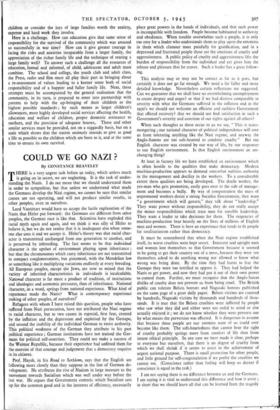THE NEED FOR CHILDREN
By EVA M. HUBBACK
THE Royal Commission on Population has, after eighteen months' gestation, produced a very small mouse in the form of a statement which, neatly expressed as it is, attempts to do no more than to sum up what is already generally known, in order to explain the need for the co-operation of the public in obtaining more in- formation. The statement reminds us of the fact that the average family size has been reduced during the last seventy years from approximately five to approximately, two, and of the strong prob- ability that shortly a decline in the population will set in which— if pre-war trends remain unchecked—will assume alarming propor- tions as successive generations pass. It emphasises the generally accepted view that the immediate cause for the fall of the birth- rate is the widespread adoption of the planned family, due to the desire of most parents for a small family and not to any physiological change.
The statement fully recognises the complexity of the causes which have led to this small-family pattern, and rightly stresses that "what determined the size of families was increasingly the ideals and senti- ments of men and women, their sense of responsibility to themselves and the community, and their hopes and fears for the future." Only as second in importance is it pointed out " that for a long time the economic and social pressures had been in favour of the very small family." The Commission is continuing to examine evidence on how to reduce these pressures, and so encourage parenthood. But it is unlikely that on many points, especially on the relative weight to be allowed to the various motives which underlie the desire to keep the family small, a quantitative .answer can ever be given. It is not difficult, however, to foresee some of the conclusions to which the Commission will be driven.
It was wise to place first the psychological and moral causes which, since 1924, have prevented the average parents from producing a family big enough to stabilise the population. The scope of the problem is even wider, since it cannot be solved unless the public as a whole is aware of the critical nature of the present situation, and the harm likely to be inflicted on the country if a cumulative decline in the population takes place. Up to now the community has not regarded the population problem as of urgent importance. In general indeed the large family has been regarded as a matter for either pity or derision, so that the effect of public opinion on potential parents has not been encouraging—nor can the considerable redis- tribution of income between those with small or no families, and those with larger ones, necessary for carrying out effective policies' to remove the obstructions to parenthood, take place unless the public as a whole is sensitive to the community's needs in these matters.
What, however, do we find? First, a widespread ignorance of the facts, since most people are only just beginning to realise that there is any problem at all. One of the most useful functions of the Com- mission itself will obviously be to dispel this ignorance. It is only during the last ten or fifteen years that the situation as it is has been recognised even by experts, and el. en today, as the statement points
out, the interpretation of what the current figures mean is still only grasped by a few. The great majority, even of thinking citizens, see that the birth-rate is still higher than the death-rate, and that since the late thirties it has been growing steadily and is higher today than at any time during the last twenty years. They do not realise that the decline of the population is being masked by the existence both of an abnormal proportion of people of child-bearing age, and of large numbers of elderly people born when the birth-rate was high. They, therefore, cannot see that there is anything wrong. Moreover, the time that must elapse before any population change can take place means that citizens who are naturally preoccupied with more imme- diate problems find it difficult to be prepared to sacrifice either thought or money for the sake of posterity.
Most obstinate of all, however, is the point of view, widely held both by potential parents and others, that whether a married couple has a family at all, and if so, of what size, is entirely their individual affair, just as it is a matter for the individual to decide whether or not to keep a pet dog. It would at present be considered an imper- tinence for any Government to demand that the nation's needs in these respects be considered: the popular hatred of the pre-war Nazi and Fascist drives for more children for cannon-fodder has accentuated this attitude. When we come to consider individual parents, the most important single cause, as the statement recognises, is the attitude of the parents to life itself. Is this a confident one? Is the world the sort of place they wish their children born into? Are they fearful of unemployment, of war and of the difficulty of maintaining or improving their standard of living if hampered by a large family?
It is undoubtedly true that in between the two wars the fear of unemployment entered into the soul of the people—both among those who shared the actual experience and those who only observed it. And the fear is still vivid amongst a large proportion of those to whom peace means the finding of a new job. The fear of war, though probably of little influence in causing a reduction in the birth-rate before the last war, may indeed assume larger proportions now. And the desire for " safety first " may well be increasing in a population such as ours, in which the average age-level is continually rising. It is probable, moreover, that the continuous decline in religious beliefs, in the proportion of people who feel at home in the world, sure of the importance of living and convinced about its purposes and ideals, are fewer than before, plays a not inconsiderable part. These fears, whether with regard to employment or war, are obviously felt most keenly among those who have a somewhat defeatist attitude to life itself. Such an attitude with regard to the War was looked upon with contempt, but in peace time it appears to be sympathised .with, and in many quarters it is regarded as a political virtue to over-stress the blemishes and inadequacies of our political and economic way of life.
In all economic sections of the population, standards of living have increased much more rapidly than have incomes. There is everywhere a rising standard of child care, of education, of housing, of recreation and holidays, as the result of which not only are children in many ways a greater expense and tie than ever before, but com- peting objects of expenditure are more and more attractive. Add to these various practical obstructions to parenthood, such as the shortage of housing, of domestic help, of nursery schools and day nurseries, of lying-in homes, &c., regarding all which any witness testifying on the subject will usually affirm that if the particular diffi- culty could be removed the parents concerned would be prepared to have large families.
But for a considerable proportion of parents, nobody can say how many, there undoubtedly appears to be a low limit to the number of children they wish to have—however favourable their circumstances may be. This, pretty certainly, was always the case ; before the days of the planned family many' unwanted children helped to swell the numbers. It is probable now that there are few potential parents who wish to have no children at all. But are there not a large propor- tion, who appear to be content with, if not one, certainly with two children, especially if these are one of each sex? So that no amount of additional income, no increase in the feeling of economic or inter- national security, no assistance to the mother, no provision of a suffi- cient number of large houses, will make such people want more children or consider the joys of large families worth the anxiety, expense and hard work they involve.
Here is a challenge. How can education give that same sense of responsibility for the survival of the community which was aroused so successfully in war time? How can it give greater courage in facing the risks and anxieties inseparable from a larger family, the appreciation of the richer family life and the technique of rearing a large family well? To answer such a challenge all the resources of education, formal and informal, of child, adolescent and adult must combine. The school and college, the youth club and adult class, the Press, radio and film must all play their part in bringing about a re-assessment of values leading to a keener sense both of social responsibility and of a happier and fuller family life. Next, these attempts must be accompanied by the general realisation that the community, in its turn, is prepared to enter into partnership with parents to help with the up-bringing of their children to the highest possible standards ; by such means as larger children's allowances, more highly developed social services affecting the health, education and welfare of children, proper domestic assistance to mothers, and the provision of adequate houses,. These and 'other similar services must be provided, not on a niggardly basis, but on a scale which shows that the nation seriously intends to give as good a life as possible to the children which are'bom to it, and at the same time to ensure its own survival.



























 Previous page
Previous page